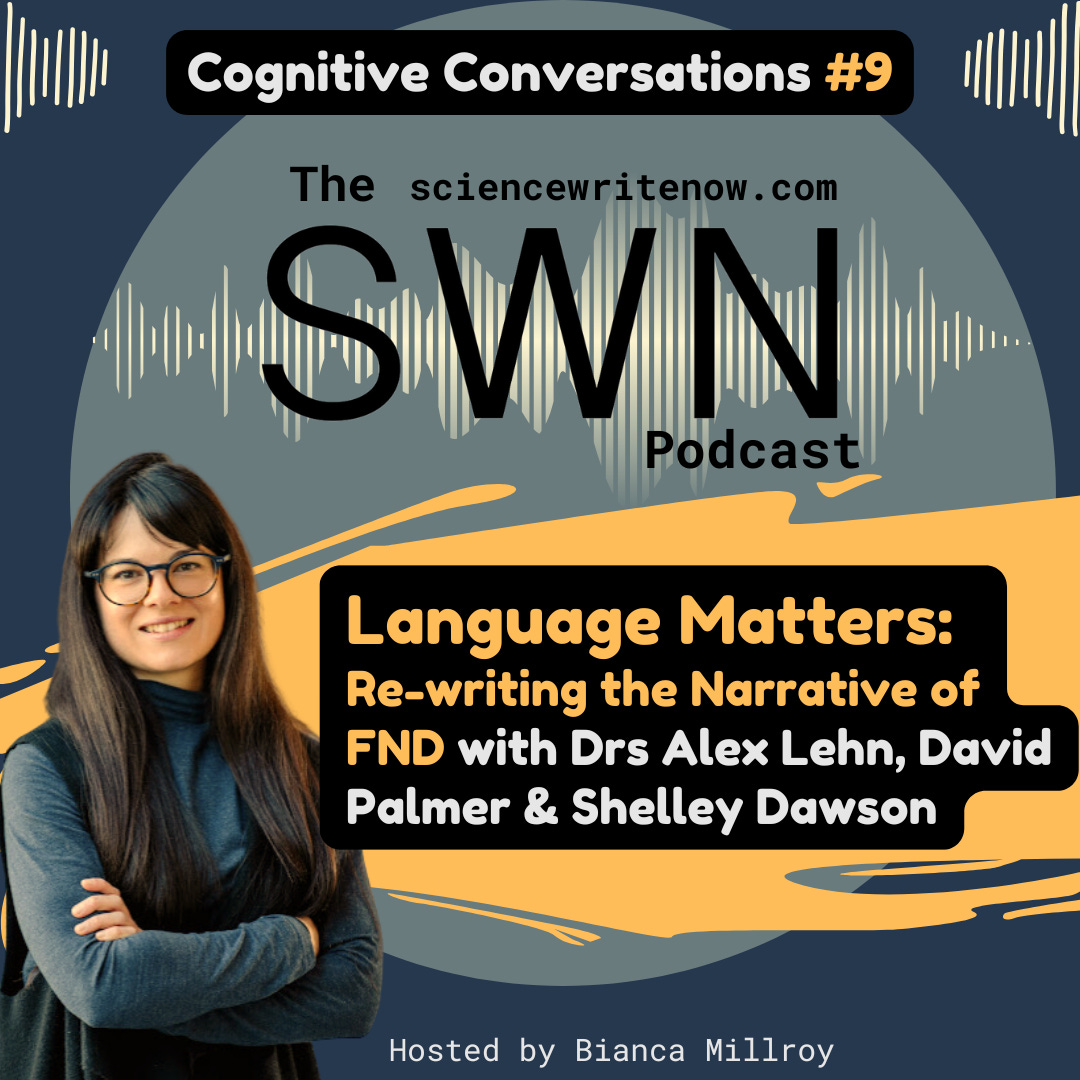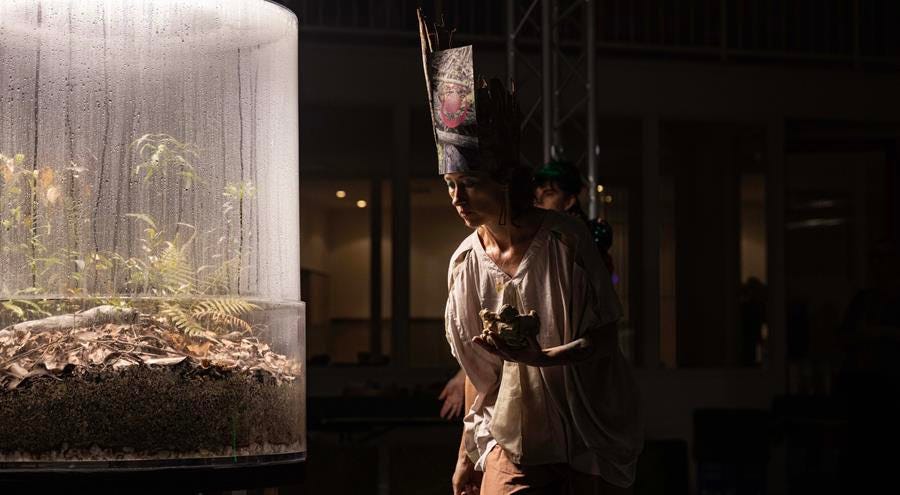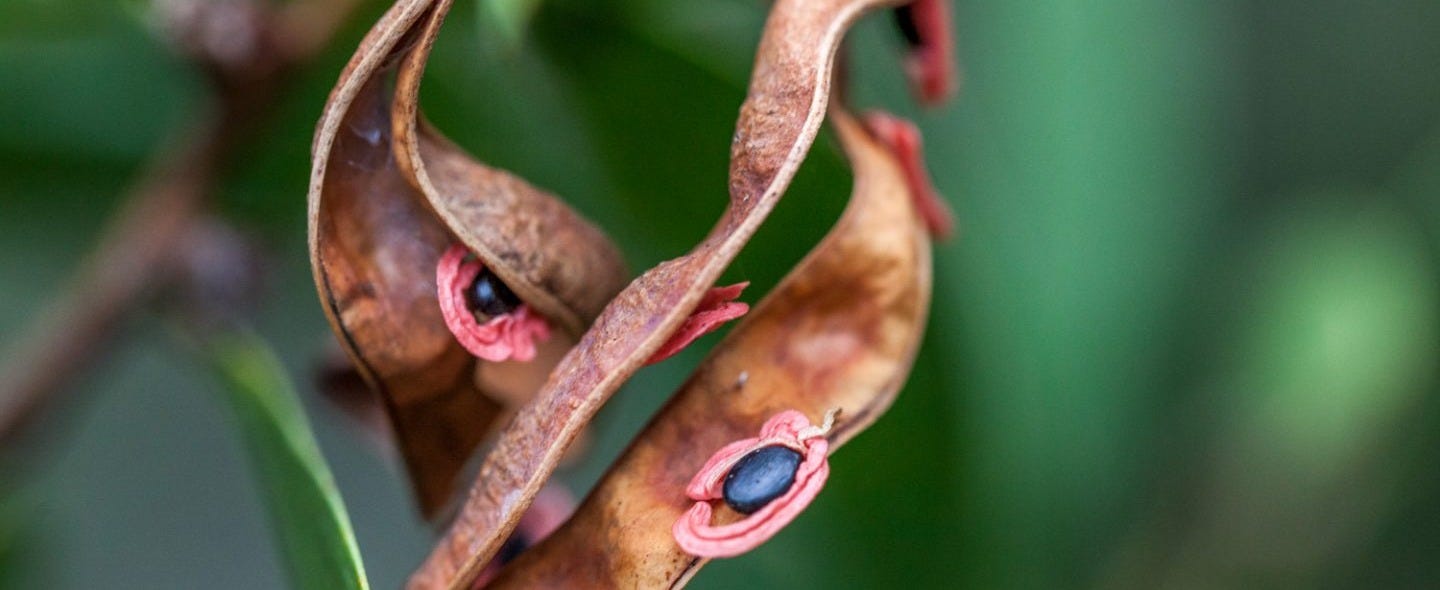Mind matters
Decoding the language of the brain with two neurologists and an expert in sociolinguistics | Cyborg beetles, AI love notes + SWN/Varuna Climate Fellows!
Cognitive Conversations #9 Language Matters: Re-writing the Narrative of Functional Neurological Disorders
This week, we chat to neurologists Dr Alex Lehn and Dr David Palmer with sociolinguistic expert, Dr Shelley Dawson on re-writing the narrative of functional neurological disorders (FND) and why labels — and language — matter.
Plus, check out our bonus episode with Dr Gillian Deakin, where we explore this topic further from the perspective of a GP!
FND is one of the most common disorders you’ve never heard of. But an estimated 4 to 12 out of 100,000 people develop FND, and it’s the second most common presentation in neurology clinics worldwide. Tests and scans such as MRIs and EEG can’t pick up functional issues, however, leaving patients misdiagnosed or dismissed. Many are told the symptoms are ‘all in their head’. Some are accused of ‘performing’ or fabricating symptoms. Most do not receive the diagnosis and treatment they desperately need, nor the healthcare they deserve. This is where the arts — our stories and language — come in. It’s time to re-write the narrative.
What we do know is that FND affects the cognitive processing and communication centre of the brain, disrupting the signals that communicate with your body. Basically, FND is a brain “software” problem, as opposed to a “hardware” problem …but does this analogy oversimplify the workings of our most complex organ?
In this conversation, we get to the heart of our grey matter, exploring a topic that is deeply personal and yet widely felt in our communities, among patients, allied health and medical experts. We uncover the historical basis, cultural discourse, and pervasive mythologies underpinning functional disorders, and what the future holds in terms of emerging research at the intersection of mind, brain and body.
Subscribe to the SWN Podcast on Spotify, Apple or Google to stay up to date with our latest episodes. Full show notes, links and resources available on our website.
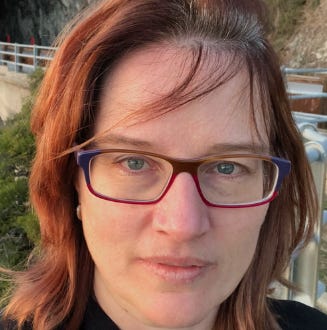
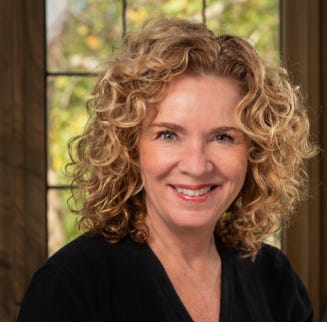
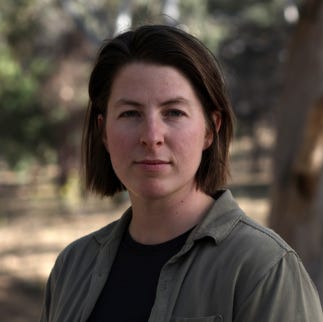
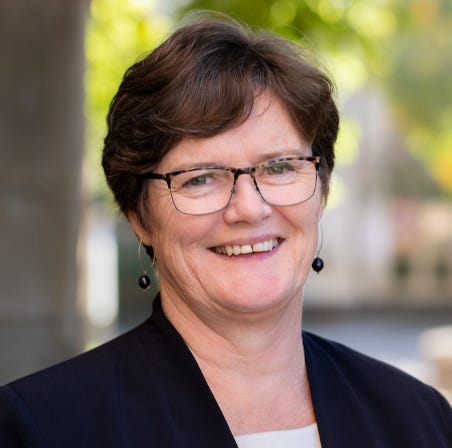
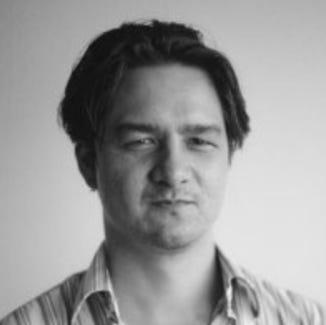
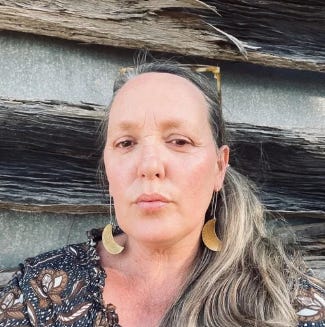
Announcing SWN’s Varuna Climate Fellows!
We’re thrilled to announce the recipients of this year’s Varuna Climate Fellowship! Congratulations to Cynthia Banham, Jo Chandler, Lauren Fuge, Lesley Head, Patrick Lau and Dani Netherclift (pictured).
The fellowship offers a week-long residency to non-fiction writers focused on projects related to climate change and the environment, with opportunities for publication in Science Write Now in 2026. The six recipients will travel to Varuna in the beautiful Blue Mountains in September for time and space to write, as well as the opportunity to connect with others working across literature, academia, science journalism, grassroots organising and activism. Fellows will take part in an online roundtable with SWN’s co-founders/editors, Drs Jessica White and Amanda Niehaus, on climate science, writing, and publishing nationally and internationally.
Editor’s Pick | Blueprint for Being
Bianca Tainsh on the artist’s paradox of boycotting plastic (Metro Arts)
During a residency in Berlin in 2019, artist Bianca Tainsh invented a Blueprint for Being – a document of personal principles to guide her artmaking and life decisions.
My Blueprint has offered clarity in recognising consumeristic shaping and in making ethical decisions, even when they aren’t so popular… which leads me to the paradox of Myc-a. Created with all good intentions… I designed Myc-a to be safe and fully self-sustaining… within a large acrylic shell. You could say that my subsequent bad karma was to grapple with the logistics of a 300kg living artwork. But I had also broken with vital aspects of the conceptual methodology that underpins all my current research…
Bianca gives a fascinating insight to her work-in-progress and explains why plastic will make no appearances in the body of work she is producing through her Metro Arts residency. Bianca’s new exhibition Terra Culture will open on 4 September 2025.
More arts-meets-science reads…
Beetles with microchip backpacks could help in future search and rescue missions in UQ News, based on new research published in Advanced Science
‘Cyborg’ beetles equipped with microchip backpacks could one day be used to help search and rescue crews locate survivors within hours instead of days following disasters such as building and mine collapses. How? Biorobotics researchers remotely guide the movement of common darkling beetles using a video game controller.
Should you get AI to write a sympathy note or love letter? on ABC Life Matters
We've started to rely on AI for many things but would you use it to write messages from the heart, such as love note, wedding vows, or a eulogy? Jason Themistoklis, a professional letter-writer and Nic Carah, professor of digital cultures untangle the topic of outsourcing our emotional labour to ChatGPT with humanity and flair.
Editing memories could change PTSD treatment: can we re-write our life? with Thompson Institute of Mind and Neuroscience director, Professor Alain Brunet
Every time a memory is recalled, it briefly becomes malleable – we can update it – before it is stored again. This process is called reconsolidation. A new neuroscience-based understanding of how the brain creates, stores, and updates memories allows us to work with traumatic memories in a way that was not possible before.
Boredom gets a bad rap. But science says it can actually be good for us: is it about time we embrace the pause? in The Conversation
As a society we are constantly overstimulated, and it can be costly to our nervous system. So should we embrace short bouts of boredom rather than reach for on-demand distractions like social media or streaming?
Wild fish use visual cues to recognise individual divers in Biology Letters
For the first time, a team of experts in evolutionary animal behaviour have trained two species of fish (saddled sea bream and black sea bream) to follow a human diver to obtain a food reward, proving that fish may use visual cues to distinguish between individual humans in the wild. But are there ethical implications for this in research?
SciArts prizes, fellowships + opportunities
Queensland Women in STEM Prize | $10,000 | Nominations closing 8 August
Do you know any extraordinary women in STEM? Nominations are now open for the 2025 Queensland Women in STEM Prize. The Women in STEM Prize is a state-wide competition for women within the first 10 years of their careers who have demonstrated exceptional leadership, innovation and impact to Queensland.
Sidney Myer Creative Fellowships | $200,000 | Nominations closing 17 August
National $200,000 tax-free grants over two years to early mid-career Australian artists, creatives and cultural leaders. Specific outcomes for the fellowships are not required.
Tim Fischer Fellowship | $50,000 | Rural & regional | Applications close 17 August
Empowering changemakers in rural and regional Australia, this Fellowship supports a recipient with up to $50,000 in funding, mentorship, and networking opportunities to help turn their bold ideas into reality.
boorda yeyi Immersive Arts Commission | PICA (WA) | Closing 18 August
Supporting Australian artists to create major new immersive artworks at the intersection of contemporary art and emerging technologies, this program invites ambitious, experimental gallery-based projects addressing critical social and political issues through innovative, interdisciplinary approaches.
Global Talent Program | Academy of Science (AU) | Applications close 29 August
The Australian Academy of Science is seeking applications from established scientists residing in the United States to register their interest in relocating to Australia.
The Hinternet Essay Prize | USD$10,000 | Closes 1 September
The Hinternet has launched its inaugural essay writing competition, which asks writers to respond to the prompt: How might current and emerging technologies best be mobilised to secure perpetual peace? The contest invites bold, independent, and engaging ideas from writers of all backgrounds, nationalities and disciplines, specialists and non-specialists alike. The prize winner will receive USD$10,000.
READ | SWN recommends…
Human Nature: Nine ways to feel about our changing planet by Kate Marvel
Scientist Kate Marvel has seen the world end before, sometimes several times a day. In the computer models she uses to study climate change, it’s easy to simulate rising temperatures, catastrophic outcomes, and bleak futures. But climate change isn’t just happening in those models. It’s happening here, to the only good planet in the universe. It’s happening to us. And she has feelings about that.
A captivating exploration of climate change that uses nine different emotions to better understand the science, history, and future of our evolving planet.
Autocorrect by Etgar Keret (translated by Jessica Cohen & Sondra Silverston)
Imagine a world in which you could take back the stupid thing you just said, unspill the coffee, roll life back thirty seconds and do it over again — this time the right way. In Etgar Keret’s universe, all things are possible. A man can take a yoga class that genuinely transforms his life. A son has the chance to redo a fateful exchange with his father. An alien can offer a guided tour of the destroyed earth…
From sci-fi scenarios to fictional thought-experiments, this surprising and darky funny short story collection delivers irreverence, existential unease, hope and humanity.
The Midnight Timetable by Bora Chung (translated by Anton Hur)
From the dark imagination of acclaimed Korean horror and sci-fi writer, Bora Chung (author of Cursed Bunny), comes a spectacular new novel-in-ghost-stories…
In a mysterious research centre that houses cursed objects, an employee on night shift at the Institute soon learns why others haven’t lasted there long… As violent allegories take on the horrors of animal testing, conversion therapy, domestic abuse, and late-stage capitalism, those who open the wrong door might find it’s disappeared behind them, or that the echoing footsteps they’re running from are their own…
Plus, check out Nerd Scribe by science journalist, Bianca Nogrady on Substack!
Every few weeks, Bianca dissects a piece she’s written and looks at where the idea came from, how she interviewed for it, researched it, structured and wrote it, and what happened after it was published. Basically, “see how the science journalism sausage is made” as Bianca says, (and learn a lot of cool stuff about the art of science writing!)
Diary of a medical conference: A day-by-day how-to for reporting on medical/scientific conferences
Cartographer of the brain: The most famous scientist you’ve never heard of…
’We need their brains!’ Navigating the sensitivities of brain donation
Nematodes, electric cars and climate finance: A week in the life of a science journalist
That time of the month, love? Complex questions of hormones and mental health.
Thanks for reading! Want more? Why not explore our open-access editions online…
SWN is supported by you, our generous readers and paid subscribers, so when we say we couldn’t do this without you, we mean it! Every contribution, big or small, helps us to publish more creative writing inspired by science and, importantly, to pay writers, poets, artists and arts workers for the work they do, so thank you!
— the SWN team
Ooh, you’ve dived deep… we take it you’ve enjoyed what you found here, and might even come back for more? Pledge your support as a paid subscriber for $8 per month or consider making a one-off tax deductible donation. We’d be chuffed!



